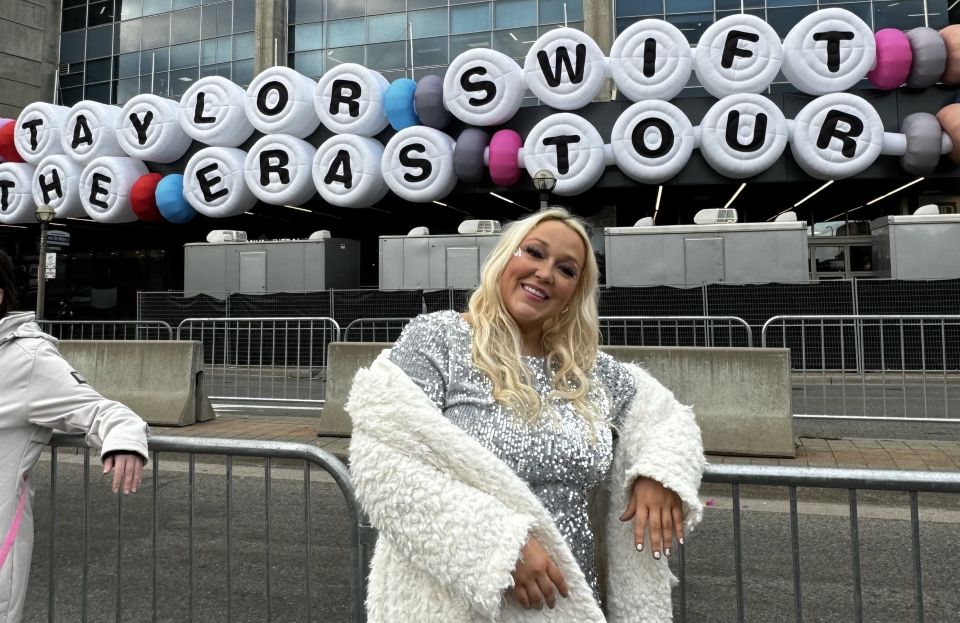
More than a migraine
Migraines weren’t uncommon for then-25-year-old Marissa Stubbert, who had experienced them since high school.
“I could always function,” Marissa says. “I know some people get a migraine and they’re down and out, but that never happened to me.”
One morning, Marissa was getting ready for work and had a migraine that wouldn’t subside.
“I thought, ‘Let me sleep it off,’” she says. “‘I need a couple hours and I’ll be in for lunch time.’ But, it never got any better. I couldn’t touch my chin to my chest. I couldn’t get out of bed without throwing up.”
Heading to the hospital
Marissa didn’t want to go to the emergency room, figuring she’d wait all day just to be told to go home and take a painkiller.
She called Telehealth Ontario (now Health811), a free, 24-7 service that provides Ontario residents with health advice from a registered nurse. The nurse she spoke to was most concerned about Marissa’s inability to move her chin to her chest and so she recommended a visit to the emergency room after all.
Marissa, who currently lives in Pickering, Ont., but lived in St. Catharines, Ont. at the time, reluctantly headed to St. Catharines Hospital (now Marotta Family Hospital). There, she had two CT scans, which revealed what doctors thought was an aneurysm.
She was transported by ambulance to Hamilton General Hospital, where she underwent another CT scan, an ultrasound, an angiogram and an MRI.
“That was on a Monday,” Marissa says. “On Friday, they told me I had a brain tumour.”
Finding out the cause
 Her tumour had split open, causing it to bleed and in turn, causing her migraine.
Her tumour had split open, causing it to bleed and in turn, causing her migraine.
Monday had been her dad’s birthday and Friday was her sister’s birthday, so it was a week of celebration along with a week of uncertainty and concern. Marissa encouraged her family to go out that Friday, telling them she’d call if she had any news.
“I was alone when the doctor told me,” Marissa recalls. “I knew I had to listen because I was alone and nobody was there to pick up what the doctor was saying. In my mind, I’m thinking, ‘I’m still a child. You can’t tell me this without my mom around.’ I was 25, so very obviously an adult, but it was a lot to process.”
She was told she’d have surgery the following Tuesday, with the surgeon explaining the complications and giving Marissa a consent form. An attending surgeon followed up, offering to answer any further questions or call Marissa’s family.
“It was really helpful that I was able to piece together what was going on with her,” Marissa says. “Being on my own, I thought, ‘It is what it is. I guess it has to be done.’”
Dealing with a diagnosis through the pandemic
Once Marissa’s loved ones learned her diagnosis, they were adamant about being by her side. As it was 2021 and the midst of the COVID-19 pandemic, Marissa was restricted to two visitors each day, and so her family and her boyfriend would cycle their visits.
Her parents were allowed to see her before the hospital’s regular visiting hours on her surgery day, walking alongside her to the operating room.
“It was really nice because obviously, the night before, I couldn’t sleep,” Marissa says. “My surgery took six or seven hours. My parents waited at the hospital all day and they were there when I woke up as well. I wasn’t fully coherent, but I knew they were there. That made a huge difference.”
Marissa’s surgeon was able to remove all but one per cent of her tumour, as it was sitting on her brain stem. A portion of the tumour was then sent off for a biopsy, while another portion was sent to a teaching hospital.
Slowing down through recovery
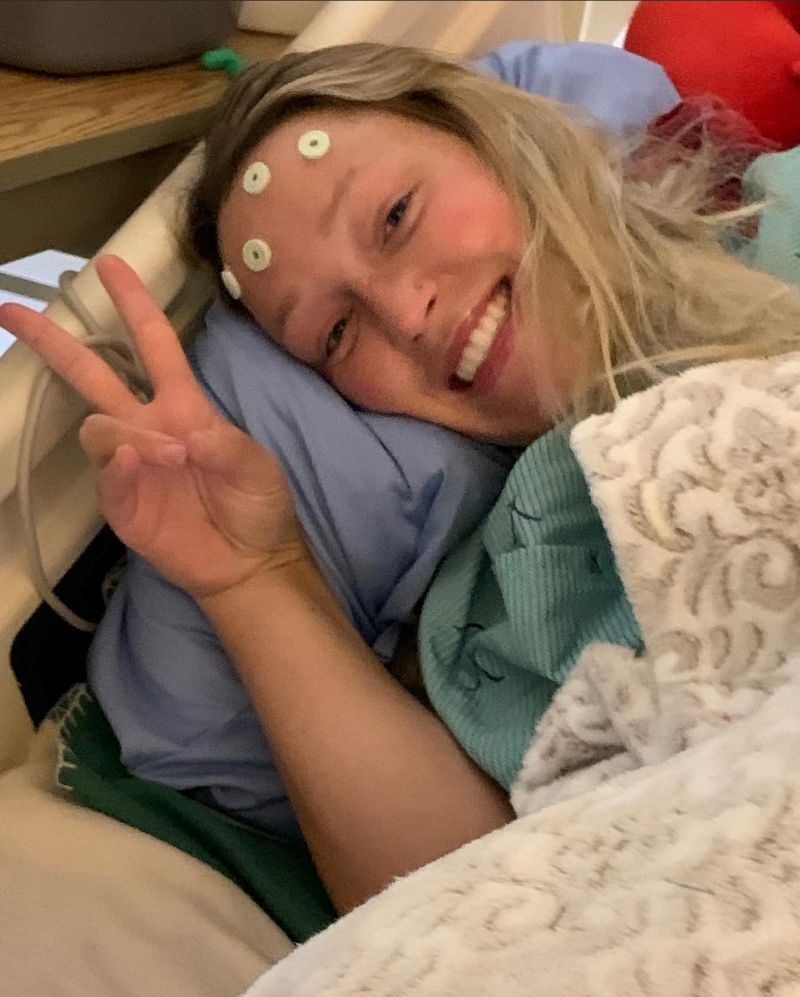 Following surgery, Marissa stayed with her parents while she recovered. Though she’d been living with her boyfriend, her mom was able to provide the around-the-clock care she needed, from helping her bathe to getting around with a walker.
Following surgery, Marissa stayed with her parents while she recovered. Though she’d been living with her boyfriend, her mom was able to provide the around-the-clock care she needed, from helping her bathe to getting around with a walker.
“I really had to slow down,” Marissa says. “I was used to being on the go, to playing sports, and then I could only do things where I could sit in a chair, like painting and colouring.”
Marissa was put on steroid medication to help with post-surgery swelling, which added to her recovery struggles.
“They did not make me feel good,” she says, of the steroids. “I understand they were doing their job, but how they made me feel, overall, was awful.”
She was also in a lot of pain and often tired, which she chalked up to recovery. Yet, it was during a routine hospital follow-up that she learned she was leaking cerebral spinal fluid, which was causing her symptoms. Marissa was brought in for emergency surgery.
“In the meantime, I found out my tumour was cancerous,” she says.
Celebrating the end of treatment
Because a small part of her tumour, an ependymoma, remained, Marissa needed radiation. She went through 32 treatments in a six-and-a-half-week period.
While her family was able to be present for the first part of her treatments, they couldn’t join her for the latter part due to tighter COVID-19 restrictions at the time.
“There was a snowstorm on my very last treatment day and I had to move my appointment to later in the week,” Marissa says. “Some of my family made the drive from up north to surprise me outside the hospital as I wasn’t allowed to have anyone in with me.”
Marissa got to ring the bell after her last appointment, to signify and celebrate the end of her treatment.
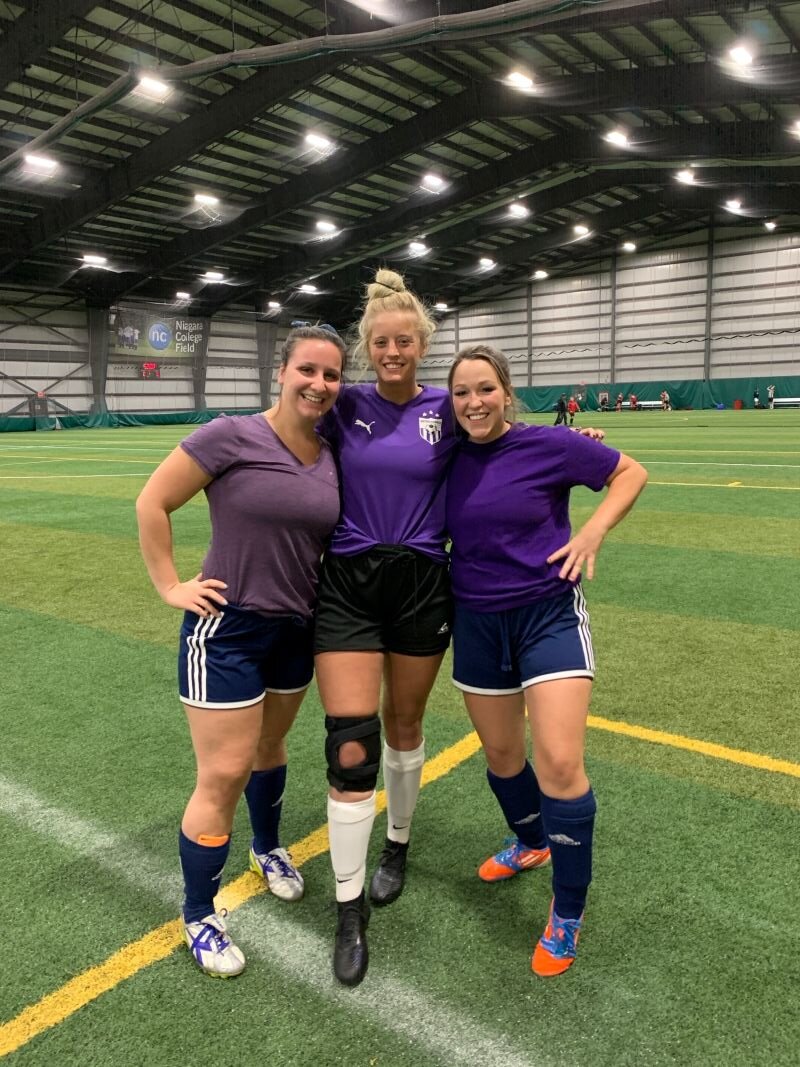 “The technician filmed it for me and the whole waiting room cheered,” Marissa says.
“The technician filmed it for me and the whole waiting room cheered,” Marissa says.
She was warned she might need steroids again following her radiation treatments, if swelling was an issue.
“Unfortunately, there was some swelling, so I had to go back on them,” Marissa says. “I ended up being on them for a few months, before I was weaned off.”
Finding a new way of life
Marissa was eager to get back to the life she knew, living in her own home and playing the sports she’d grown up playing. Though she’d played basketball, volleyball and soccer in her youth, it was soccer that stuck with her into adulthood.
She’d played in her women’s soccer league the week before she had the migraine that landed her in hospital, supporting her team in the stands as well between surgeries. Being able to play again, only a few months after she’d finished radiation, was an accomplishment, though tougher than she expected.
“I got the go-ahead from my doctors that I could play, but it was hard to try to be who I was before all of this happened,” Marissa says. “I couldn’t play the way I used to.”
Though Marissa enjoyed the camaraderie that came with joining soccer again and the support of her teammates, who helped carry her through her hardest time, she decided to take a step back and watch from the sidelines after her first season back.
Leaning on her support system
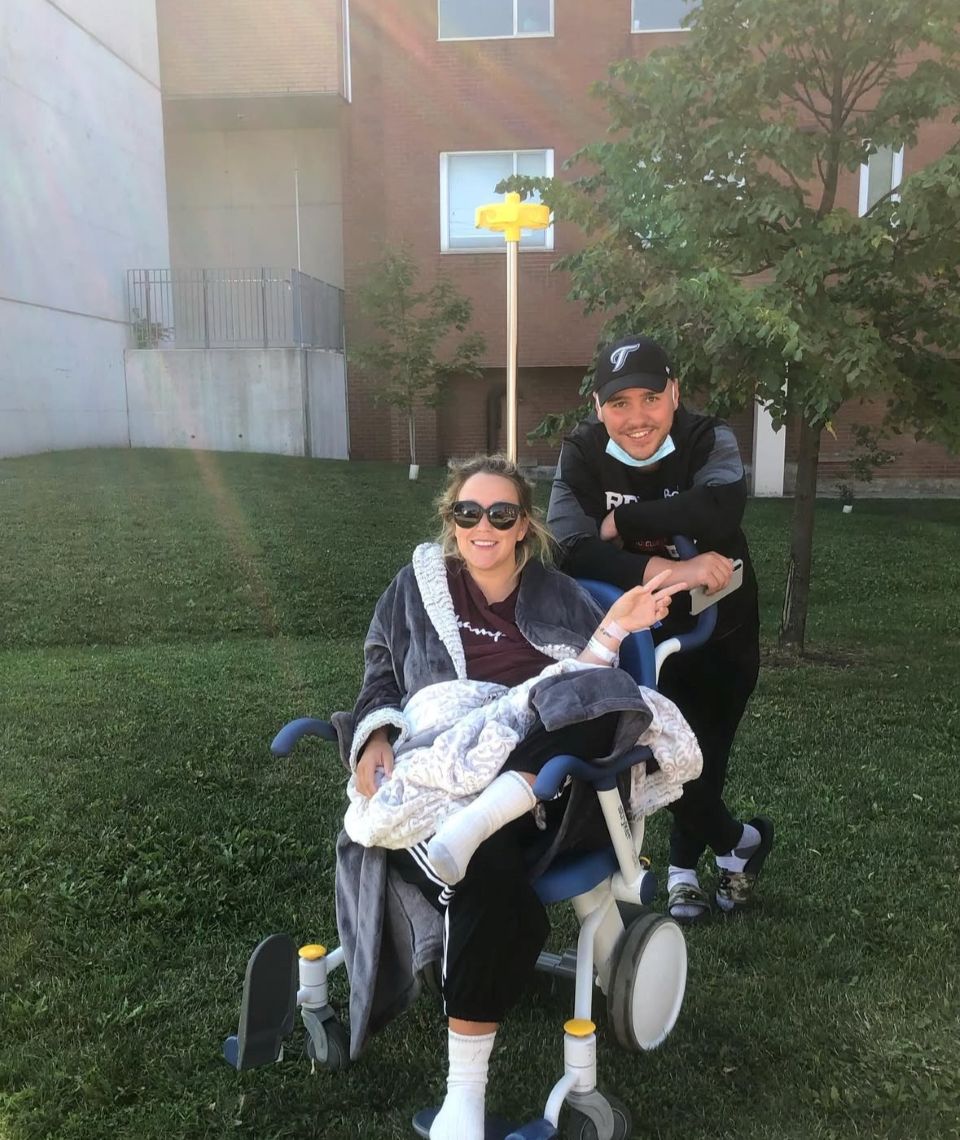 “I’ve had such a good support system,” Marissa says. “People would drop off food, clothes, activities for me to do. It was like a community that rallied around me. It definitely made things easier for me to deal with.”
“I’ve had such a good support system,” Marissa says. “People would drop off food, clothes, activities for me to do. It was like a community that rallied around me. It definitely made things easier for me to deal with.”
From the friends who reached out, to her boyfriend, Caelan, and his parents, to Marissa’s parents, Diane and Barry, and sister, Kylee, Marissa is grateful for those who showed up for her.
“My boyfriend and I hadn’t been dating long, maybe around a year,” Marissa says. “He’s the one who found me in bed that day and took me to the hospital. He brought me anything I needed, commuting to Hamilton from St. Catharines. His parents offered up their home in Hamilton to me and my family. My sister was always there, making me laugh, and my parents were my support system through it all.”
Marissa had been working as a dental assistant before her diagnosis, with her colleagues and workplace helping her ease back into it with reduced hours and responsibilities.
“My work gave me a lot of space and a lot of support,” Marissa says. “When I came back, I took it easy. I never felt rushed to get where I once was.”
She still struggled with routine and fatigue, particularly in the morning. Marissa ended up taking a serving job, which meant later nights instead of early mornings. She eventually found her way back to dentistry, working with children and youth, in a job she loves.
“I’m allowed to feel this way”
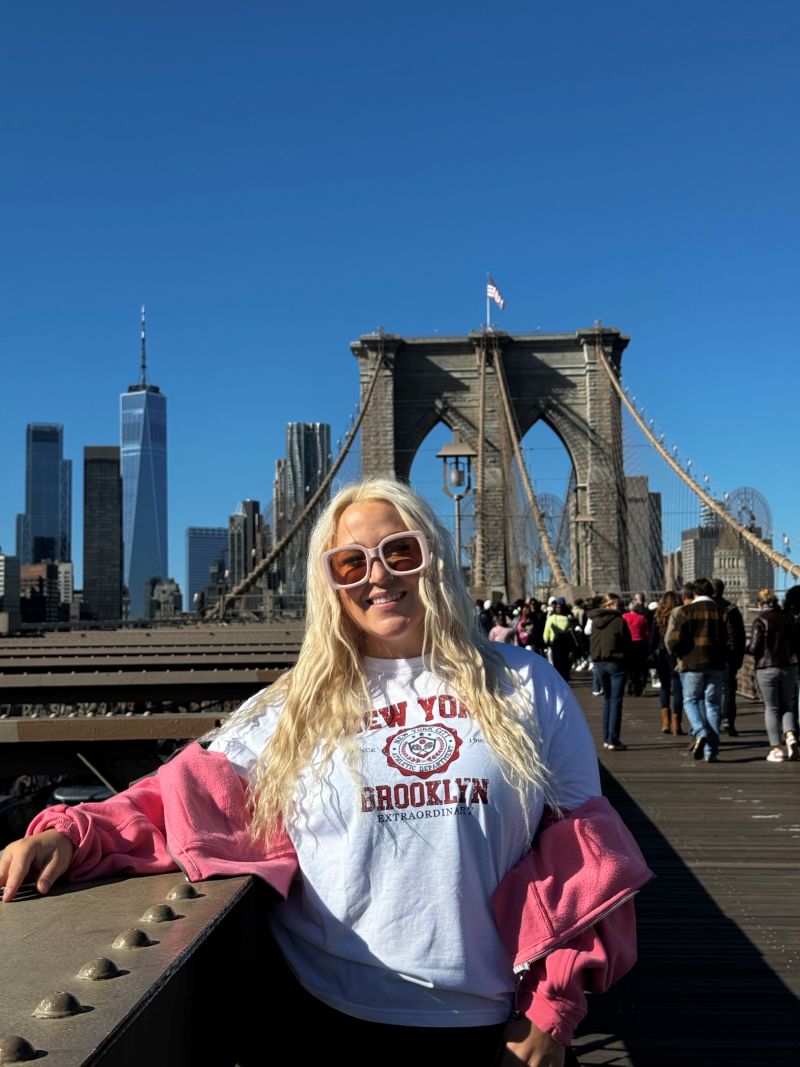 “I’m focused on taking care of myself and getting my energy back,” she says. “Some days, I almost forget everything that happened.”
“I’m focused on taking care of myself and getting my energy back,” she says. “Some days, I almost forget everything that happened.”
“I remind myself, I’m allowed to feel this way or to have this happen. I just have to give myself some grace.”
Her MRI schedule has moved from three months to six months, with her most recent scan taking place this past June. Her next scan will determine whether she stays on a six-month schedule or moves to nine months.
“A lot of people might not like to go for scans, but I think it’s awesome that I’m getting watched and followed by my medical team,” Marissa says. “It makes me feel more comfortable that it’s not going to turn into what it was.”
Marissa encourages others to listen to their bodies and follow up when something isn’t “normal.”
“It’s not normal to have headaches all the time,” she says. “It’s not normal to go through life unwell and to have to push through to go to work or do activities. You have to be your own advocate, because nobody knows what’s going on except for you.”